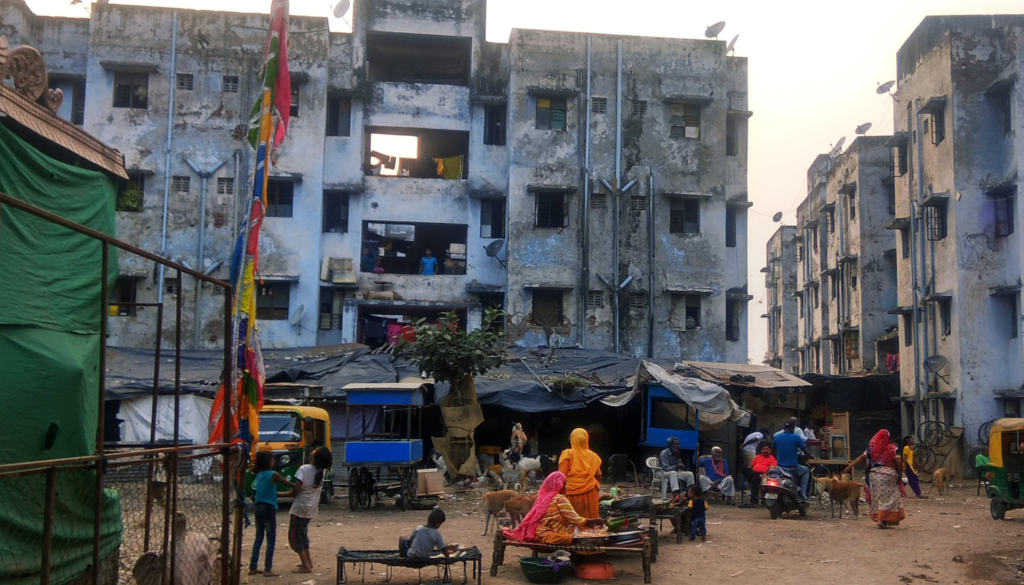IMPACT STORY: Co-creating accountability and governance in slum relocation sites in Ahmedabad, India
An ARISE Impact Story by SPARC India
ARISE’s Community Based Participatory Research (CBPR) approach to working with community members in Ahmedabad relocation colonies contributed to the identification and prioritisation of community needs and the creation of governance structures within fragmented resident welfare associations. Community peer-to-peer exchanges were held between other relocation and resettlement (R&R) sites, the communities in Ahmedabad and Mahila Milan in Mumbai and Surat. These led to improved relationships among residents, leadership across relocation sites and increased capacities and interest of community members to seek accountability from governance actors in order to improve their living conditions and wellbeing.
Background
Between 2009 and 2012, tens of thousands of residents of riverfront slums colonies in Ahmedabad were displaced to make way for the Sabarmati Riverfront redevelopment project. They were moved to 32 R&R sites in various parts of the city. The relocation process dislocated residents from existing community support structures and mechanisms to hold authorities to account.
People in slum relocation sites in Ahmedabad suffer due to poor institutional support post-relocation, poor access to basic services and caste conflicts among residents. Living conditions at the relocation sites compromise both personal safety and health due to the low quality of building structures and water and sanitation infrastructure. Lack of maintenance further exacerbates poor living conditions for the residents.
These issues largely emerge due to poor local accountability and weak governance structures, such as Co-operative Societies responsible for operations and maintenance and keeping the colonies in order.
There is a need to bring community members together to demand change from governance actors, addressing concerns of health and safety and the well-being of communities. This is done through collaboration, partnerships and series of consultations with governance actors. However, there is a complex web of power and governance issues that need to be negotiated.
Impact
The Society for the Promotion of Area Resource Centers (SPARC) began working with community members in the Ahmedabad relocation colonies in 2019 as part of the ARISE project. At that time there was a sense of distrust in the community toward anyone, including academics and NGOs. As one Surya resident stated, “NGOs just come and go; nothing changes for us.”
ARISE had originally intended to collaborate with community members to address health issues. However, it soon became clear that other social determinants of health, such as badly damaged infrastructure, needed to be prioritised before focusing on human health. Damage to the infrastructure was significant and persistent, with community members losing hope of improvements. One community member said, “The condition of these buildings is like our lives, broken and hopeless.”
ARISE worked with community members to map service infrastructure to identify, prioritise and facilitate urgent infrastructural improvements, including fixing corroded water pipes, overhead water tanks at risk of collapsing and the structural deterioration of buildings including water seepage, corroded exterior walls and peeling off of exterior walls. This helped community members to gain agency and confidence in the process, as they could see tangible results through their engagement with ARISE.
Eight community exchanges were held between the community in Ahmedabad and Mahila Milan, several of which focused on supporting women’s representation and leadership for improved accountability-seeking processes. In relocation colonies, women were generally underrepresented in conversations and decision-making processes. Despite being told by men that women tend not to participate, during a community exchange visit in May 2022, Mahila Milan encouraged women in the colonies to actively participate.
These meetings empowered women to form groups, address local issues and voice their opinions and priorities. As a result, more women began participating in the process, and have begun demanding accountability. For example, when the only water pump in their area was pumping sand and mud, it needed to be fixed immediately. However, there were delays on account of the local governance actors. So about 40 women prevented staff members from leaving the governance offices and refused to budge until their demands were met. Not only did the pump get fixed on the same day, but they also experienced the power of an organised community, setting a precedent for themselves and for the other residents and rekindling their sense of community.
The experience of, “travelling to learn from other communities that have had similar lives as ours,” was new to the Surya residents. The exchanges were frequent, repeated and staggered for them to be effective. While it took multiple visits to show evidence of what was learned and exchanged, each visit produced micro actions around one community issue and strengthened the residents’ commitment to forming a functional housing society.
Lessons learned
There have been increased numbers of women participating in meetings and other accountability-seeking actions in the Ahmedabad relocation colonies, opening the possibility of women taking on leadership roles going forward. Additionally, there are a lack of organised groups for accountability-seeking in the colonies, and, for the most part, only the people that have always been in leadership roles in their locality volunteer to lead. These may require longer term efforts and relationship-building over time to really make the communities’ organisation streamlined.
What next
After seeing the kind of work that SPARC and ARISE has been doing with communities in Ahmedabad, other neighbouring communities have come forward with their interest to work with us on similar issues related to improvements in structural and housing issues, water supply, safety, open spaces, livelihood, identification documents and accountability mechanisms. This methodology will be replicated and scaled up in three more sites as part of an associated piece of PhD research.
Relevant resources:
